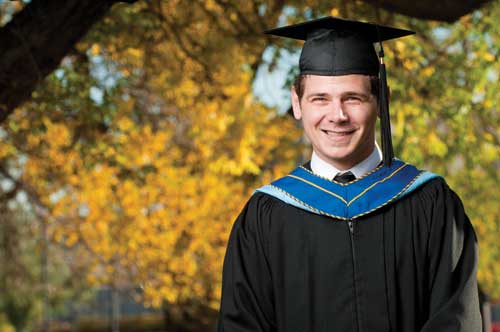Reality for Chad Befus (BSc '08, MSc '10) came from looking into the eyes of his co-workers, on a frigid Arctic work site toward the end of another 16-hour day. He needed to go to school.
"In the Arctic, when you're out there working what seems like a never-ending day in minus-60 degree weather, you get that feeling you need to go do something else," says Befus, whose indirect route to the University of Lethbridge included a work stint in the seismic trade after graduating from Calgary's William Aberhart High School.
"It was long hours and very hard work. There were guys working there, and they were very impressive people, who were 60 years old – I just didn't want to be them at 60."
So he looked south to the U of L and, taking the advice of friends who'd said he was always "good with computers", and threw himself into computer science with a determination steeled by his time in the workforce.
"My time away from school is what told me I needed to come to university and do my bachelor's degree," he says. "It also drove me to work so hard to complete it."

A second work experience sent Befus back to school once more, this time to complete his master's degree. He says he doesn't need a third reality check, having already been accepted into a PhD program at the University of London. The academic world is where Befus plans to stay.
"I was fortunate enough to do a co-op program with Shell Canada in my fourth year and it was an excellent experience," says Befus, who was offered a full-time job as a result.
"I likely could have spent the rest of my life there as a programmer, but I didn't find it especially challenging. It gave me yet another perspective and drove me back into university."
The U of L hooked Befus very early in his post-secondary career.
"One of my first classes was with Dr. Yllias Chali. He has such a spark of enthusiasm for his work that all the kids in his class are just drawn in by him," says Befus. "He is so exciting and interesting, and I give him a great deal of credit because that first class at university was so fun and so interesting, that appeal just stuck with me."
When seeking a graduate program, students are often advised to look beyond the confines of the school at which they earned their bachelor's degree. Befus, having built a rapport with his professors, respectfully ignored that counsel.
"For me, the idea of working for some stranger, not knowing what I'd be working on or what environment I'd be in, just didn't appeal to me," he says. "I wanted to come back and work for one of the professors that I did know, who would challenge me and give me enough leash to be able to go out and do the tasks."
Befus' research interest is in music information retrieval, essentially applying computers to music. As a computer scientist his work is on the systemic side of the equation, how to make computers more accurately represent music. It's not a one-discipline problem however, and Befus says his exposure to the artistic and psychological components have given him a more complete approach.
"I know people who have gone to other universities who stick to their respective areas, and they become very good in those areas. Here you're forced to take different disciplines as an undergraduate, things such as psychology courses, social science courses, art courses, and that's what I find really interesting. I like to go out of my box," he says.
He credits that interdisciplinary approach for enhancing his critical thinking skills.
"If you've got a breadth of knowledge, you can come at a solution from a direction that nobody else will," Befus says. "Somebody coming from a background in music might approach the same problem differently than someone from computer science or psychology. The U of L has helped me see that interdisciplinary areas of research are much more interesting."
It also contributed to his finding a PhD opportunity with Dr. Geraint Wiggins at Goldsmiths' College at the University of London.
"From what I've read of his work, his department is very connected with the other aspects of this field, you'll see all three areas represented," says Befus. "I have experience with that and it's what interests me."
He admits the experience will once again take him out of his comfort zone. London is a long way from the U of L and his hometown of Calgary, and even further from his time in the Arctic.
"Back then I wanted to work on cars or something like that, being a doctor seemed out of this world to me because you had to be a brain to do that," he laughs.
"I've never done anything quite like this. It's going a little bit further than I'm used to, so it should be interesting."
GET THE FACTS
· Befus has an older brother currently pursuing his master's in earth sciences at the University of Calgary.
· His mother was born in Lethbridge and has a nursing degree from the U of C, while his father has a bachelor's degree from the U of C and a law degree from University of Victoria.
· Befus met his PhD supervisor after earning the right to present a paper at the International Computer Music Conference in New York.
· He earned his studentship at University of London after winning one of three spots from among 80 applicants.
· He describes the practical applications of his research by saying, "The idea is we can do things like search or classify music better, simply because we can get a more accurate representation of music itself at a workable level."
